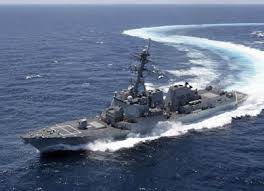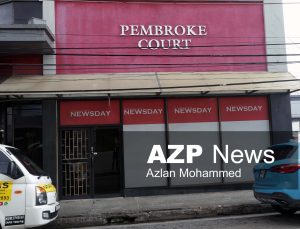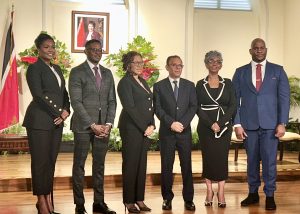By Prior Beharry
THE Ministry of Foreign and Caricom Affairs has announced that the USS Gravely, an Arleigh Burke-class guided-missile destroyer, will visit Trinidad and Tobago next week, mooring in Port of Spain from Sunday, October 26, to Thursday, October 30.
The ministry said the visit will include joint training between the 22nd US Marine Expeditionary Unit and the Trinidad and Tobago Defence Force (TTDF), focusing on core infantry tactics, maintenance procedures, and advanced medical capabilities. The exercises aim to “strengthen interoperability, reinforce long-term defense cooperation, and improve operational readiness among partner forces,” the ministry’s release stated. “The US military services’ presence in Trinidad and Tobago highlights the U.S. commitment to regional security and cooperative efforts in the Caribbean.”
The USS Gravely is one of at least three Arleigh Burke-class destroyers—alongside the USS Jason Dunham and USS Sampson—deployed to the Caribbean since September 2 as part of a wider US military presence in the region. The ships have conducted counter-narcotics patrols, maritime surveillance, and escort missions, according to US statements. Arleigh Burke-class destroyers carry advanced radar and missile systems that provide both defensive and offensive capabilities. Each vessel’s strike package includes Tomahawk cruise missiles with a range of more than 1,000 miles.
The arrival comes as the United States intensifies operations targeting drug-trafficking networks across the Caribbean. US officials say at least 10,000 personnel have been deployed to the region for counter-narcotics activities. In February, the US State Department designated Venezuelan group Tren de Aragua and others as Specially Designated Global Terrorists (SDGTs).
US forces have also carried out at least eight strikes on boats in recent months, actions Washington says targeted vessels engaged in narcotics trafficking. Those operations have killed at least 34 people, according to public statements. In announcing recent actions, US officials compared some drug-trafficking groups to militant organisations such as Al Qaeda.
In remarks at the White House earlier Thursday, US President Donald Trump said he had authorised the Central Intelligence Agency to conduct operations in Venezuela and signaled he would bypass Congress to carry out further military strikes against drug cartels, expanding activities from sea to land.
The planned port call by the USS Gravely follows weeks of heightened rhetoric in the region. Prime Minister Kamla Persad-Bissessar has publicly supported the US anti-drug effort, describing the renewed US posture as a necessary response to narcotics trafficking.
As the US began its buildup in late August, the prime minister pledged “unflinching” access to Trinidad and Tobago’s territory in the event of a Venezuelan attack on Guyana. After the first US strike on an alleged drug-carrying boat resulted in multiple deaths, she welcomed the operation and said US forces should deal with drug traffickers violently.
At the same time, Persad-Bissessar on Thursday urged calm, saying she had received no information suggesting an imminent war between the United States and Venezuela. “If and when there is a war, we will let you know,” she told reporters, addressing speculation and calling on the public to avoid fearmongering.
Venezuelan officials have warned regional governments against allowing their territories to be used for operations against Caracas. In September, Venezuelan Defence Minister Vladimir Padrino López cautioned that attacks on Venezuela launched from neighboring countries would draw a response. “To the governments of the Cooperative Republic of Guyana and the government of Trinidad and Tobago, who have played along: if they attack you from your territory, you will also receive a response, and that is legitimate defense,” he said.
The USS Gravely’s visit is part of a longstanding pattern of US naval stops and security cooperation activities in the Caribbean, but it coincides with a period of notable military activity and political tension.
![]()











